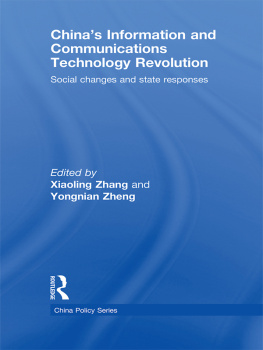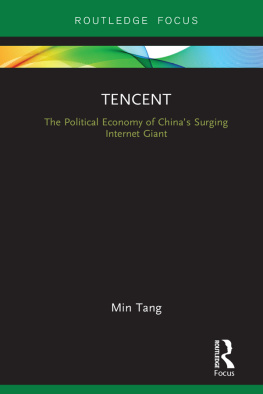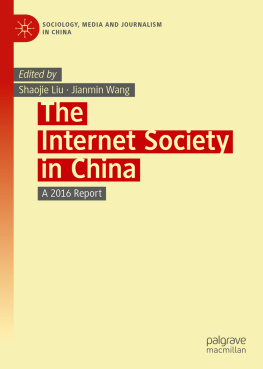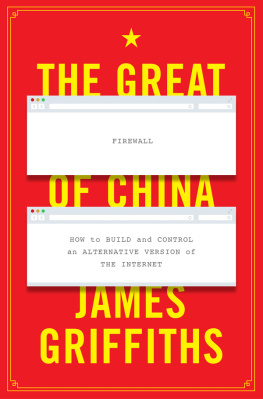
REDWIRED
CHINAS INTERNET REVOLUTION
Sherman So & J. Christopher Westland
This book offers valuable hindsight, insights and foresights of Chinas internet evolution.
Richard Ji, Managing Director, Morgan Stanley Research.
Sherman So
& J. Christopher Westland
Red Wired
Chinas Internet Revolution






Copyright 2010 Sherman So & J. Christopher Westland First published in 2010 by Marshall Cavendish Business An imprint of Marshall Cavendish International PO Box 65829
London EC1P 1NY
United Kingdom
and
1 New Industrial Road
Singapore 536196
genrefsales@sg.marshallcavendish.com
www.marshallcavendish.com/genref
Marshall Cavendish is a trademark of Times Publishing Limited Other Marshall Cavendish offices:
Marshall Cavendish International (Asia) Private Limited, 1 New Industrial Road, Singapore 536196 Marshall Cavendish Corporation. 99 White Plains Road, Tarrytown NY 10591-9001, USA Marshall Cavendish International (Thailand) Co Ltd. 253 Asoke, 12th Floor, Sukhumvit 21 Road, Klongtoey Nua, Wattana, Bangkok 10110, Thailand Marshall Cavendish (Malaysia) Sdn Bhd, Times Subang, Lot 46, Subang Hi-Tech Industrial Park, Batu Tiga, 40000 Shah Alam, Selangor Darul Ehsan, Malaysia The right of Sherman So & J. Christopher Westland to be identified as the authors of this work has been asserted by them in accordance with the Copyright, Designs and Patents Act 1988.
All rights reserved
No part of this publication may be reproduced, stored in a retrieval system or transmitted, in any form or by any means, electronic, mechanical, photocopying, recording or otherwise, without the prior permission of the copyright owner. Requests for permission should be addressed to the publisher.
The author and publisher have used their best efforts in preparing this book and disclaim liability arising directly and indirectly from the use and application of this book.
All reasonable efforts have been made to obtain necessary copyright permissions. Any omissions or errors are unintentional and will, if brought to the attention of the publisher, be corrected in future printings.
A CIP record for this book is available from the British Library ISBN 978-0-462-09967-5
Project managed by Cambridge Publishing Management Ltd Printed and bound in Singapore by Times Printers Pte Ltd Contents
Acknowledgments............................................... iv Preface........................................................ v The state of the revolution......................................... vii 1 News 24/7: Sinas story.................................. 1
2 Being there with Ctrip.................................. 22
3 Traffic alert: Baidu..................................... 41
4 Googles China odyssey................................. 60
5 Alibaba: The electric souq............................... 79
6 Taobao: A market for the rest of us......................... 93
7 Tencent: I seek you................................... 112
8 Shanda: Pay now, enjoy later............................ 122
9 Shanda: Freebirds reign................................ 137
10 The mobile internet revolution........................... 160
11 Youku: Waltzing with the State........................... 178
12 The expats......................................... 195
What have we learned?................................... 207
Internet development: Chinas conundrum...................... 220
Chinas internet and the new regionalism....................... 224
Appendix: Chinese internet in figures............................... 234
Acknowledgments
No book is solely the product of its authors. First and foremost, our gratitude goes to James Allen; after spending long hours editing and reviewing, he is almost like the third author of the book.
We are indebted to Jacky Huang of IDC China, Dick Wei of J.P.
Morgan, Richard Ji of Morgan Stanley, and Jason Brueschke of Citigroup for sharing their knowledge of the Chinese internet sector and their continual support for our research in the area.
We are also grateful to the following people who shared their first-hand experiences in the Chinese internet sector, either during our research for the book, or during co-author Sherman Sos previous work at the South China Morning Post: Wang Zhidong, Lee Kaifu, John Liu, Jack Ma, Bo Shao, Joe Chen, Victor Koo, Gary Chen, Pang Shengdong, Merle Hinrichs, Foo Jixun, Jay Chang, Porter Erisman, Marc van der Chijs, T. R. Harrington, Fritz Demopoulos, Richard Robinson, Alvin Liu, Oliver He, Clement Song, Eric He, Bryan Yuan, Fan Min, Neil Shen, Justin Tang, Kevin Wang, Liu Dejian, Joe Wu, Chen Nian, Vincent Gao, JP Gan, Leong May Seey, and Lawrence Tse.
We want to especially thank Kou Xiaowei of the General Administration of Press and Publication for helping us to understand the Chinese governments role in the countrys internet development.
We would also like to thank the many other people who contributed valuable information to the book, but all of whose names cannot be mentioned.
Thanks to Stuart Jackson, Mark Clifford, and David Savelson, who read and commented on all or part of the manuscript. Our thanks also go to some of the staff at the South China Morning PostEdward Collis, Tim Leemaster, and Michael Logan, for their help in moving the project forward.
Finally we would like to thank our publisher, Marshall Cavendish, for publishing the book quickly at a time when the Chinese internet sector is still unfolding. We especially thank Martin Liu for his enthusiasm for the project, and Karen Beaulah and Jane Fieldsend for expertly handling our manuscript and dealing with the many last-minute changes.
Preface
The Chinese share an imprecation (the first of three) May you live ininteresting times.1 The other two are considered even more forbidding
May you come to the attention of those in authority; and May you find whatyou are looking for. In contrast we, as authors, are blessed to live in interesting times; otherwise our search for discourse and rich veins of material might grow ever more taxing. And the internets rise in China has made for very interesting times, to say the least. In the coming pages, intrepid reader, we will show how internet entrepreneurs have discovered and invented ways to thrive through clever adaptation to Chinas unique environment, and tell gripping tales of entrepreneurs who have gone from the brink of bankruptcy to huge riches.
Our interest in the Chinese internet grew out of a pivotal development. What was once an American Cold War invention has evolved into a major economic and social tool for Americas erstwhile adversary, and now partner, on the world stage. By 2008, the number of internet users in China had outstripped Americas at 298 million, and by 2009, China had 338 million internet users (more people than the entire population of America).
Next page















